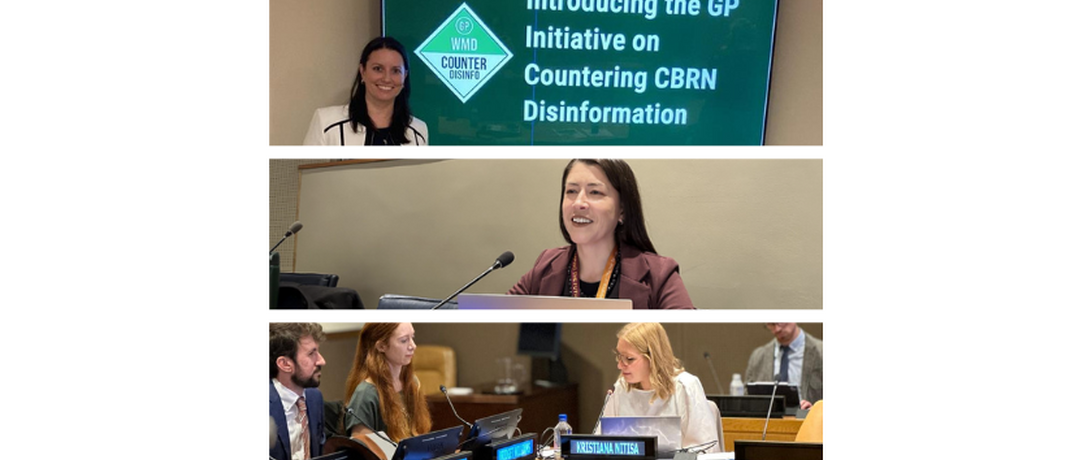
From 7 October to 8 November 2024, Open Nuclear Network (ONN) participated in the 79th session of the UN General Assembly (UNGA) First Committee on Disarmament and International Security in New York, the United States.
During the four-week event, ONN focused on four key activities:
Side Event “Global Partnership Initiative on Countering CBRN Disinformation”
On 10 October, ONN Senior Analyst Sarah Laderman spoke on a panel hosted by the Global Partnership Against the Spread of Weapons and Materials of Mass Destruction's (GP) Countering Weapons of Mass Destruction (WMD) Disinformation Initiative to support the Initiative’s work on chemical, biological, radiological and nuclear (CBRN) disinformation to the UNGA First Committee Delegates.
Canadian Ambassador Peter MacDougall, Permanent Representative to the Office of the United Nations and to the Conference on Disarmament, and Adedeji Ebo, Director and Deputy to the High Representative for Disarmament Affairs (UNODA), opened the panel, followed by a discussion featuring project partners from the Atlantic Council Digital Forensic Research Lab (DFRLab), the Johns Hopkins Center for Health Security (JHCHS) and King’s College London (KCL).
ONN discussed past and current examples of radiological and nuclear disinformation and our organisation’s work in support of the Initiative's efforts to analyse and counter these contemporary disinformation narratives.
Learn more about the Initiative [here].
"Statement on CBRN Disinformation” on behalf of the GP Countering WMD Disinformation Initiative
On 16 October 2024, ONN Research and Analysis Manager Marcy R. Fowler delivered a statement to the UNGA First Committee on behalf of the GP's Countering WMD Disinformation Initiative. ONN emphasised the escalating threat posed by disinformation in the CBRN sectors. Such disinformation exploits the technical complexity and dual-use nature of CBRN activities, undermining trust in critical international treaties, including the Biological Weapons Convention (BWC), Chemical Weapons Convention (CWC) and the Treaty on the Non-Proliferation of Nuclear Weapons (NPT).
The statement spotlighted the launch of the G7-led GP Counter WMD Disinformation Initiative, which employs an ambitious, multidisciplinary and evidence-based approach to understand and address disinformation. Delegations were encouraged to engage with the initiative’s resources at GPWMDcounterdisinfo.com, which offers insights, analyses and strategies to combat CBRN disinformation.
Read the full statement [here].
Side Event ‘’Transparency, accountability and strengthening the Nuclear Non-Proliferation Treaty review process: why they matter’’
On 29 October, ONN Engagement and Research Assistant Kristiana Nitisa spoke on a panel hosted by the Non-Proliferation and Disarmament Initiative (NPDI), which consists of 12 members - Australia, Canada, Chile, Germany, Japan, Mexico, the Netherlands, Nigeria, the Philippines, Poland, Türkiye and the United Arab Emirates, to discuss how transparency and accountability can strengthen the NPT and what steps can be taken to translate discussions last year into action, including at the final NPT Preparatory Committee meeting in New York in April 2025.
The opening remarks were delivered by Ambassador Ichikawa Tomiko, Permanent Representative of Japan to the Conference on Disarmament and Ambassador Harold Agyeman, Ghana's Representative to the United Nations and Chair of the 2025 NPT Preparatory Committee. The panel discussion included remarks from Ambassador Robert in den Bosch, Disarmament Ambassador to the Conference on Disarmament, Netherlands, Ambassador Adam Scheinman, Special Representative of the President for Nuclear Nonproliferation, United States and Chris King, Chief, Weapons of Mass Destruction Branch, UNODA.
ONN gave remarks on its work on the promotion of the transparency and accountability in the field of nuclear risk reduction, described the methodologies used in its work and talked about the how ONN’s efforts in the promotion of the transparency and accountability can contribute to the discussion in the NPT Review Process.
Side Event: "A Gamble of Our Own Choosing: Forecasting Strategies to Reduce Nuclear Risks"
On 30 October, ONN and the Forecasting Research Institute (FRI), in partnership with the UNODA and the Austrian Ministry for Foreign Affairs, co-hosted a hybrid event titled "A Gamble of Our Own Choosing: Forecasting Strategies to Reduce Nuclear Risks" at the UNGA First Committee in New York. Moderated by Kristiana Nitisa from ONN, the session featured experts such as Karim Kamel (ONN Foresight and Prediction Specialist), Christopher King (UNODA), George-Wilhelm Gallhofer (Austrian Ministry for Foreign Affairs), and Josh Rosenberg and Bridget Williams from FRI. The event attracted approximately 100 participants, attending both online and in person.
The event included a presentation and discussion on ONN and FRI's joint study “Can Humanity Achieve a Century of Nuclear Peace? Expert Forecasts of Nuclear Risk”, which aims to forecast the risk of nuclear catastrophe by 2045. This research, the largest systematic survey of nuclear risk experts to date, gathered insights from 151 participants, including 110 nuclear experts and 41 superforecasters. It assesses the probability of a nuclear catastrophe (defined as an event causing over 10 million deaths), identifies key risk pathways and evaluates the impact of various policies aimed at reducing these risks.
The event’s key takeaways included the importance of establishing secure crisis communication networks and conducting fail-safe safety reviews, identified as critical measures to reduce nuclear risks. Forecasting methodologies were presented as a structured, probability-based approach that provides valuable insights to complement traditional policy strategies. The discussions underscored the need for diverse expert perspectives from various regions and backgrounds to ensure balanced, reliable assessments of nuclear risks. Experts also emphasised the growing complexity of nuclear risks in today’s geopolitical landscape, especially with the rapid advancement of technology, calling for governance frameworks to address these emerging challenges. While forecasting is a powerful tool, the event highlighted the need to integrate it with qualitative strategic foresight. Further research is needed to refine forecasting methods, making them more responsive to current events and actionable for policymakers.
The event concluded with an interactive forecasting exercise, allowing attendees to engage directly with the forecasting methodology by assessing nuclear risk scenarios.
The report can be accessed [here].